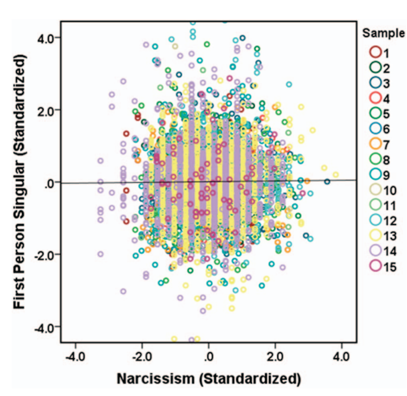Could this really be the end?
« previous post | next post »
..of the nonsense about narcissism and pronoun counts? Probably not, but it should be.
I'm talking about Angela L. Carey, Melanie S. Brucks, Albrecht CP Küfner, Nicholas S. Holtzman, Mitja D. Back, M. Brent Donnellan, James W. Pennebaker, and Matthias R. Mehl, "Narcissism and the use of personal pronouns revisited", Journal of Personality and Social Psychology, 3/30/2015:
Among both laypersons and researchers, extensive use of first-person singular pronouns (i.e., I-talk) is considered a face-valid linguistic marker of narcissism. However, the assumed relation between narcissism and I-talk has yet to be subjected to a strong empirical test. Accordingly, we conducted a large-scale (N = 4,811), multisite (5 labs), multimeasure (5 narcissism measures) and dual-language (English and German) investigation to quantify how strongly narcissism is related to using more first-person singular pronouns across different theoretically relevant communication contexts (identity-related, personal, impersonal, private, public, and stream-of-consciousness tasks). Overall (r = .02, 95% CI [−.02, .04]) and within the sampled contexts, narcissism was unrelated to use of first-person singular pronouns (total, subjective, objective, and possessive). This consistent near-zero effect has important implications for making inferences about narcissism from pronoun use and prompts questions about why I-talk tends to be strongly perceived as an indicator of narcissism in the absence of an underlying actual association between the 2 variables.
And those "strong perceptions" are not just the territory of professional liars like George F. Will — look at the contortions that a crew of psychologists go through to try to support preconceptions about the Narcissism of Kids Today, by reference to pronoun usage in song lyrics over time: "Lyrical Narcissism?", 4/9/2011.
From the cited Carey et al. paper, a lovely scatter plot of the empirical relationship between various measures of Narcissism and first-singular-pronoun rates in various sorts of material:

Charles Broming said,
April 10, 2015 @ 8:38 am
I sure hope so.
Dougal Stanton said,
April 10, 2015 @ 9:08 am
The people involved will have to be interested in the facts before they become important in defining/restricting the conversation. Some people have no excuse – the professional liars as you call them. Others blurt something out on instinct which others then take as fact because it fits their story.
See the Scottish televised political debate where an audience member accuses the current First Minister of not letting anyone speak uninterrupted. I don't believe the man in the audience was taking notes but everybody's reaction was as if he had been taking notes. Suddenly the story was that FM Nicola Sturgeon was bossy – or was that the story to start with, and this was the evidence supplied to support it?
Nikki said,
April 10, 2015 @ 1:38 pm
"Basically, we discovered that in any interaction, the person with the higher status uses I-words less (yes, less) than people who are low in status. The effects were quite robust "
Source: http://www.scientificamerican.com/article/the-secret-language-code/
It is a reasonable assumption that low-status individuals are generally not more narcissistic, particularly so during interactions with high-status ones.
Rubrick said,
April 10, 2015 @ 6:19 pm
Fine, but what does this have to do with me?
MattF said,
April 10, 2015 @ 8:48 pm
That scatter plot is lovely. Is it even possible to show less correlation?
Alan Palmer said,
April 13, 2015 @ 9:41 am
I agree about the scatter plot. As a work of art it is superb; as a method of proving that the use of personal pronouns indicates narcissism it is worse than useless.
blognetnews » Die Narzissmuskeule said,
April 22, 2015 @ 5:46 am
[…] Sie regelmäßig im LANGUAGE LOG vorbeischauen, dann haben Sie letztens dort vielleicht Mark Libermans Kommentar zu einer Studie gelesen, die keinen Zusammenhang von Narzissmus und der Verwendung von […]